Newbin Santhosh
Fujitsu Scholar on the 2019 Fall Course
Championing the cause of Diversity & Inclusion in India
Profile
Human Resources Manager
Ephphatha Institute for the Deaf
Interview
South India native Newbin Santhosh wants to open up career options for those whose paths have been limited. After years of working with non-profits, he has put his human resources background to work in support of the hearing-impaired in his hometown, far from the nearest higher education opportunities. In the Global Leaders for Innovation and Knowledge program, Santhosh saw the opportunity to learn new things and strengthen his skills to better help those in need. By focusing on UN Sustainable Development Goals (SDGs) and ways to get businesses involved through corporate social responsibility (CSR) initiatives, he is set to turn his Capstone Project into a way for his fellow citizens to build a better future for themselves.
―Tell us a bit about your background.
I’m from India. The state of Tamil Nadu in South India, to be exact. I grew up in a rural village but moved to a city called Chennai for my college education. I’ve been working there for the past 10 years.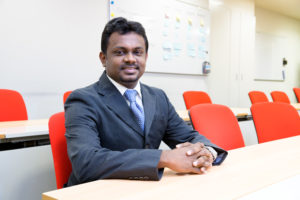
I started by doing a Bachelor of Social Work at Madras Christian College. We were more focused on experiential learning from the campus rather than just classrooms. That helped me to develop myself as a person. Out of my experience on the campus, I wanted to do my post-graduate degree in human resources management, because I’m more of a people person. I like to engage with people, spend time with them.
So, I started my career working in human resources. But I’ve been volunteering with many non-profit organizations (NPOs) during the course of my career, where I developed more interest in community work. I switched to work at a community-based organization and, after working there for the past five years, I have moved back to my hometown and am working with hearing-impaired children.
―What is the subject of your Capstone Project?
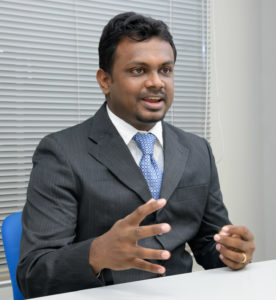 My Capstone Project is about creating inclusive communities by working with hearing-impaired students. That is quite important in my community because, after school, hearing-impaired students don’t have many opportunities for skill development or higher education. That’s becoming a social problem. They are just staying at home and being unproductive. Sometimes families find them a burden, because they have to bear the financial expenses. And parents worry about the future, because who takes care of them after their parents? So, I found that a lot of human resources were being wasted here—we are losing a lot. Organizations can make use of them, and it’s a win–win for everyone if they are well equipped and skilled. So, my Capstone Project is about creating a skill development program for hearing-impaired students.
My Capstone Project is about creating inclusive communities by working with hearing-impaired students. That is quite important in my community because, after school, hearing-impaired students don’t have many opportunities for skill development or higher education. That’s becoming a social problem. They are just staying at home and being unproductive. Sometimes families find them a burden, because they have to bear the financial expenses. And parents worry about the future, because who takes care of them after their parents? So, I found that a lot of human resources were being wasted here—we are losing a lot. Organizations can make use of them, and it’s a win–win for everyone if they are well equipped and skilled. So, my Capstone Project is about creating a skill development program for hearing-impaired students.
―Why is this a personal cause for you?
I’ve been volunteering with many NPOs in the past, and this organization is in my hometown, where I used to volunteer, so I know the organization and the city. Working closely with the founders and the key functionaries in the organization helped me understand some of the needs in the community, where there is a vacuum to be filled, because the nearest higher education opportunity for hearing-impaired students in my community is 100 kilometers away—and the next nearest is 700 kilometers away—so there is a lot of need. Since I’ve worked closely with the people involved in this organization, I found this to be one topic I should definitely work with.
―How do you open paths for these students through your project?
It’s about giving them choices. We all have choices and we gain different experiences by engaging with people. We know what options we have when we choose a career. But these students don’t have options. Regrettably, it was often thought that deaf people cannot be trained intellectually—they can only be trained vocationally to do manual work. But in our experience, we’ve found that they’re really intelligent and they are able to do well. On an experimental basis, we tried to coach some students to pursue college graduation. They were successful. So, what I’m planning to do is to offer a platform where students aged 17–21 would experience different skills and discover where their passion is. By offering them a platter of opportunities, they will taste different things and say, “Okay, this is my area of interest.” And we will assist them to pursue that. That’s the idea of the program.
―Are you tying into any particular UN SDGs?
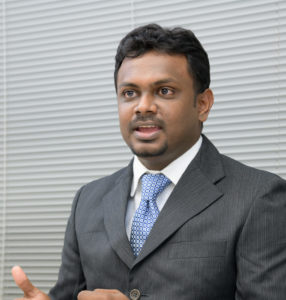 Yes. Goal 4, Quality Education, is one that we will be contributing to. Another is meaningful employment opportunities, which is part of Goal 8, Decent Work and Economic Growth. Meaningful jobs will help people sustain themselves, so they have more equality, which also ties into Goal 10, Reduced Inequality. These are the three sustainable development goals I will be contributing to by working on this project.
Yes. Goal 4, Quality Education, is one that we will be contributing to. Another is meaningful employment opportunities, which is part of Goal 8, Decent Work and Economic Growth. Meaningful jobs will help people sustain themselves, so they have more equality, which also ties into Goal 10, Reduced Inequality. These are the three sustainable development goals I will be contributing to by working on this project.
―How has your experience been participating in the Global Leaders for Innovation and Knowledge program?
The program has given me a lot of opportunities to visit places, observe, have very in-depth classroom discussions, and learn from very learned professors. I especially benefited from the visits we made to many places in Japan, Hawaii, Singapore, and Thailand. These opportunities gave me a chance to observe many best practices. It may not be directly working with disabilities, but seeing how several organizations are being sustainable, how they are contributing to their local communities, preparing their work, and being innovative. These are things I learned.
―Do you think the importance of CSR will continue to grow?
Yes, things are changing and, today, we are talking about business organizations being socially minded. In the same way, organizations that are working on humanitarian causes should be business minded. I think we will strike a balance so that organizations can be sustainable. This is something that really struck me in this program and changed my way of looking at service.
Being a person from a human resource background, I was in touch with many organizations that are doing CSR. But sometimes it shouldn’t be like a dichotomy, CSR and business. Our business should be CSR, and there can be programs to specially focus on social aspects. In that way, we can have a separate CSR department, but it’s not like saying we can do our business and CSR separately. They go hand in hand. Service is something everyone should deliver, not just NGOs. It’s for everyone. We are here to create common good for the society, be it business or social. We have to have a blend of all these things.
―How does the diversity of the program help?
Because we are 15 participants from eight countries—and from very different educational and professional backgrounds—it brings a lot of perspectives. During classroom discussions, I always bring a humanitarian perspective to things. But my colleagues sometimes bring a very different one, such as a business perspective, which is also important for me. When I build an organization or a project, I should see how it is financially sustainable and how I’m able to mobilize resources. It should all go hand in hand. A good businessperson should be a good humanitarian. A humanitarian should be a good businessperson. And we were focusing more on ethical leadership, so I think these are very important lessons that I learned from the program.
―What did you know you needed to improve in yourself?
When I joined the program, I was looking forward to knowledge management, which I had heard of but did not have much idea about. We all see knowledge as an important asset for organizations, but how do you develop knowledge? How can an organization continuously create knowledge? What kind of shared context be created? How should a leader foster such a knowledge-creating culture? I learned about all this through knowledge management.
Also, the module in Hawaii was particularly interesting to me. We were learning liberal arts in Hawaii, so many of the lessons were things I could reflect on. I could compare and contrast with how things happen in my country, why things are happening the way they are. For example, we were learning about human predicaments. We have technological solutions for many problems in the world, but still we are not able to overcome these challenges. Why? It is not about the absence of a solution but about human predicament—the priorities of human beings being geared towards different things. So, it was more about deep introspection and reflections for me in Hawaii.
―What did you learn about leadership through the program?
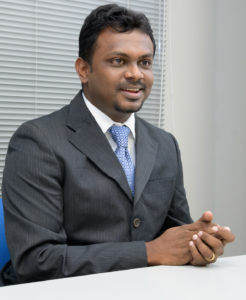 One important thing is that leadership is not about dominance or power. That is what I learned. It’s not even about the leader, it’s about people. It’s about influencing them and helping them to align with the values and the vision. That is the primary role of a leader. This is what I saw in the Doi Tung Project, which was initiated by the royal family in Thailand. They chose to take a very humanitarian and compassionate approach to the reform of opium cultivators rather than just enforcing power. So, leadership is about how we inspire people to change, not about enforcing change.
One important thing is that leadership is not about dominance or power. That is what I learned. It’s not even about the leader, it’s about people. It’s about influencing them and helping them to align with the values and the vision. That is the primary role of a leader. This is what I saw in the Doi Tung Project, which was initiated by the royal family in Thailand. They chose to take a very humanitarian and compassionate approach to the reform of opium cultivators rather than just enforcing power. So, leadership is about how we inspire people to change, not about enforcing change.
―What challenges did you face working in such a diverse group?
We have several groups—small groups. For every course, I’ll be in a different group with different members. It is very dynamic, and sometimes we have to adapt to be part of a group with different people. Their way of thinking, their way of doing things is different. So, I sometimes have to adapt quickly. That has been quite challenging for me, but, when I think back on it, that has been a very good experience. In a short period of time, I was able to get along with a very diverse group, and we were able to do really well in different areas.
In Hawaii, we were developing a program for the transgender community. We were a team of three, and we each had different views about the cause of the issue. So, we had to overcome a lot of barriers to first understand each other, to get on the same page, and then work on the project. We had to really spend time to get aligned, and only then were we able to really work on the project. So, it was really fruitful when we were able to get the Best Project award.
This is the first international experience for me to work with such a diverse group of people. In my country, we are quite multicultural, but working with an international group is very different. It really helped me shape myself to see things though everyone’s eyes, to empathize with each other and see things from their perspective. It’s not about anyone being right or wrong, it’s about our perspectives and previous experiences that shape our thinking.
I’m not saying that working with different people will always be smooth—we have to learn from others, be open, and be ready to unlearn. If everyone is on the same page, it is very ideal, but that often doesn’t happen. We have to get things aligned over a period by understanding each other. So, it is about how we overcome different barriers and various challenges to working with people.
―Where do you see yourself in 10 years?
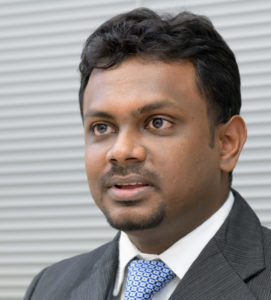 I want to create a place where people can learn about best practices for helping disabled people by empowering them, giving them opportunities, and giving them choices so that they can be successful. I want to develop my organization as a successful model of a hub for learning for different people. So, I wish to establish a Center for Excellence for skill building and mainstreaming disabled people that would promote diversity and inclusion in society.
I want to create a place where people can learn about best practices for helping disabled people by empowering them, giving them opportunities, and giving them choices so that they can be successful. I want to develop my organization as a successful model of a hub for learning for different people. So, I wish to establish a Center for Excellence for skill building and mainstreaming disabled people that would promote diversity and inclusion in society.
―What advice do you have for someone thinking of applying to this program?
If someone is interested in applying, they should be really open minded. We all have our own perceptions about things and past experiences, but you should be very neutral and willing to learn things and gain new perspectives from different people. And you should be someone who is—if not comfortable—at least open to being with different kinds of people.



